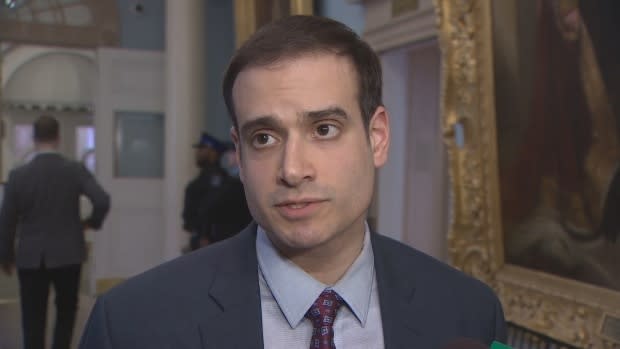What lack of high-speed internet means for students as their education is about to resume
Brad Dash isn't simply a guy who wants to stream the latest season of Better Call Saul.
"This pandemic has really brought to light that it's not just a frustration that I can't watch Netflix," the Mount Uniacke, N.S., resident said in a telephone interview.
"My kids — and potentially other kids in the province I'm sure are going through the same thing — have a real chance of being left behind."
Earlier this week, the Nova Scotia government announced plans to help public school students continue their education even as the COVID-19 pandemic has shut down schools until at least the beginning of May. Students have been out of class since they started March Break, as the province seeks to minimize spread of the virus.
All-inclusive education packages coming soon
Although students and teachers with high-speed internet access will, in many cases, do coursework and communicate online, those who don't will be able to rely on work packages sent to their homes every two weeks.
In an interview Thursday, Education Minister Zach Churchill said the packages would be sent to each student from primary to Grade 9 every two weeks via the SaltWire Network's flyer distribution service. The materials will contain work for each of the grades.
Parents who aren't enrolled in the flyer program will soon receive — if they haven't already — directions for how to get the flyers. The packages, which are also being printed by SaltWire and are said to resemble newspapers, will also go to homes that don't have students but do take flyers.
"It's cheaper to send it out to everybody, basically, than to target it," said Churchill.
A spokesperson for the Education Department said about 340,000 education packages would be printed and distributed next week. The cost is about $50,000 biweekly.
Dash, whose kids are in grade 10 and 8, said he thinks the government is doing the best it can in a difficult situation.
But he remains concerned his kids will be at a disadvantage because they won't be able to use the internet for their work and they might have less access to their teachers.
'This isn't going to be an elegant process'
Churchill is matter of fact about the challenges that exist with the situation, but he said his department, along with the Nova Scotia Teachers Union and Public School Administrators Association of Nova Scotia, is doing everything possible to make sure no one is left behind.
"This isn't going to be an elegant process. It's learning as we go. So there are going to be some gaps."
Those gaps aren't just technological.
The minister said he fully expects there will be differences from household to household in terms of how the situation can be treated.
In anticipation of that, there will be units for teachers this summer to make sure any student who is falling behind gets the help they need to catch up during the next school year, said Churchill.
"We're playing the hand we have right now to the best of our ability. This is not perfect. We're going to be learning as we go as well, just like every other province."
Teachers are already contacting students to determine the best method of communication and Churchill said every student, regardless of the strength of internet signal or availability of technology in their home, will have a way to regularly communicate with teachers.

Dash, whose neighbourhood is about a kilometre away from a fibre-optic cable, said the pandemic has highlighted to him just how crucial it is to have a strong, reliable internet signal, particularly at a time when libraries and other public buildings are closed.
In February, the province announced $43 million from the $193-million internet trust fund for the first round of efforts to extend high-speed internet to hard-to-connect areas. It's part of a multi-year plan to get the service as widespread as possible under the direction of Develop Nova Scotia.
On March 20, as cases of COVID-19 were becoming present in the province, the government announced a $15-million incentive fund in an effort to get the companies to do the connection work even faster.
On Friday, Premier Stephen McNeil said 1,600 homes have been connected to high-speed since the incentive was announced.
Steve Song, who has advocated for cheaper, improved access to high-speed internet, said the pandemic has underscored that it's a necessity, not a luxury, to have the service, particularly as people are being asked to work and learn from home.
Lack of high-speed contributes to inequality
Song, who does have reliable service at his home just outside Lunenburg, N.S., said people with access to affordable internet are able to prosper in terms of better access to opportunities and improved education.
"Whereas those without access to internet fall further behind simply by standing still. I think it's a direct contributor to inequality."
Although he praised the Liberal government's recent efforts to expand service, Song said there are limitations to a commercial approach.
He'd like to see other options pursued in tandem, such as setting up co-operatives in communities that are particularly small and might not have the financial resources to otherwise bankroll extension of service. It's an approach he said has worked in northern England.
Meanwhile, Dash is waiting to see how things go with his kids' education.
At the best of times, schoolwork can be a challenge without high-speed access at home, be it for doing research or simply watching a video a teacher might recommend, he said.
"My kids and other kids just can't do it, and it's very frustrating."
MORE TOP STORIES

